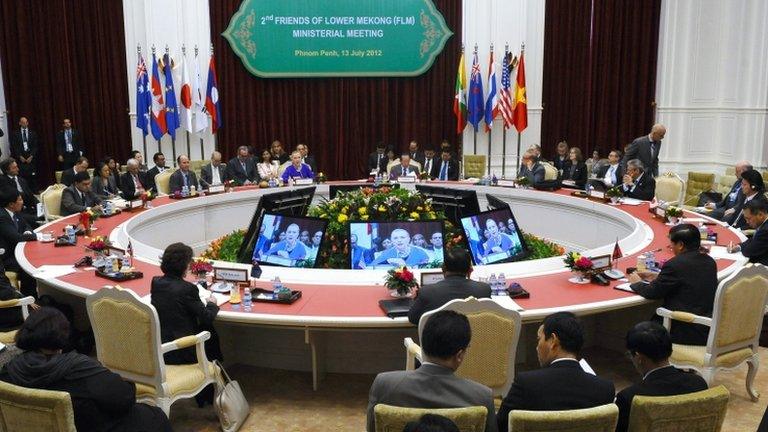Obama at Asean summit urges nations to ease sea rows
- Published
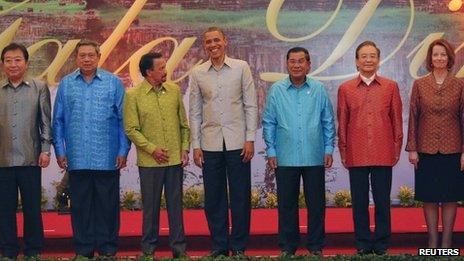
Mr Obama (centre) was part of talks between Asian nations that saw discussion of maritime rows and trade pacts
US President Barack Obama has urged Asian nations to ease tensions over maritime disputes, amid terse exchanges at the end of a summit in Cambodia.
China and the Philippines openly clashed over who owns islands in the South China Sea, as the East Asia summit came to a close in Phnomh Penh.
Mr Obama warned against allowing such disputes to escalate.
Japanese and Australian leaders also attended the meeting, which was part of regional Asean talks.
The BBC's Jonah Fisher, in Phnomh Penh, says it was an acrimonious end to a summit in which South East Asian countries failed to reach consensus among themselves over how to resolve the various territorial disputes with China.
Mr Obama's arrival on Monday at the regional talks between the Association of South East Asian Nations (Asean) and other partner countries came amid fractious debate on the maritime row between China and its Asian neighbours.
The Scarborough Shoal, or Huangyan islands as they are called in China, were at the centre of a stand-off between China and the Philippines earlier this year.
On Tuesday the US president met Chinese Premier Wen Jiabao but did not refer to the row in public comments.
The "co-operative and constructive approach" the US and China had taken to ties served both countries, Mr Obama said, but "clear rules of the road" were needed for international trade.
Mr Wen, for his part, said economic co-operation would be enhanced "as a means to tackle the difficulties we have and resolve the difference and disagreements between us".
Both sides ignored shouted questions from reporters about the South China Sea, AFP news agency said.
"President Obama's message is there needs to be a reduction of the tensions," deputy National Security adviser, Ben Rhodes, said after the summit.
"There is no reason to risk any potential escalation, particularly when you have two of the world's largest economies - China and Japan - associated with some of those disputes."
China claims a U-shaped swathe of the South China Sea, including areas also claimed by Vietnam, the Philippines, Malaysia and Brunei.
Tensions have been high with Manila and Hanoi in recent months amid stand-offs and minor clashes around shoals and islands disputed with China.
The last Asean summit in July broke up acrimoniously, without a joint communique, with China facing accusations of using its clout to force host Cambodia to keep the territorial issue off the agenda.
Tensions continued at the latest summit. Cambodia said on Sunday that Asean nations had agreed not to "internationalise" the issue, something Beijing has been pushing for.
But on Monday, the Philippines - which has been boosting ties with the US - said no such accord had been reached and that it had "the inherent right to defend its national interests when deemed necessary".
The Philippines lodged a formal protest against Cambodia, saying that it was trying to contain discussions on the matter.
China said it did not want to bring the disputes to such a forum. "We do not want to give over emphasis to the territorial disputes and differences, and we don't think it's a good idea to spread a sense of tension in this region," Wen Jiabao told the summit, according to Chinese Deputy Foreign Minister Fu Ying.
Japanese Prime Minister Yoshihiko Noda also raised security concerns in a meeting with Mr Obama. Japan is currently embroiled in a separate territorial dispute with Beijing over islands in the East China Sea.
"With the increasing severity of the security environment in East Asia, the importance of the Japan-US alliance is increasing," Mr Noda said.
Trade moves
Discussions at the summit also focused on at least three free trade pacts in the region.
Officials from China, Japan and South Korea met on the sidelines to start talks on the possibility of a free-trade zone, the three countries said in a joint statement.
Asean countries and China, Japan, South Korea, India, Australia and New Zealand have also launched negotiations for the Regional Comprehensive Economic Partnership (RCEP) trade pact, which seeks to strengthen regional trade.
The US also led the Trans-Pacific Partnership (TPP) negotiations which currently involve four countries from Asean - Singapore, Brunei, Malaysia and Vietnam.
Mr Obama arrived in Cambodia from Burma, where he spent six hours meeting top leaders.
The first visit to the country by a serving US president, it was seen as a response to reforms initiated by the government of President Thein Sein.
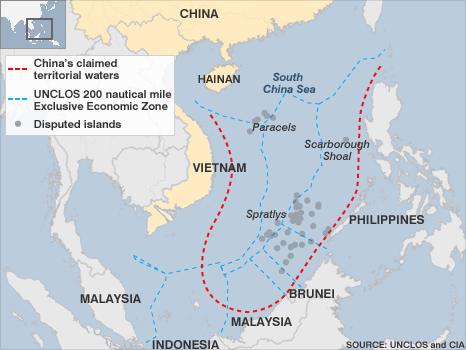
- Published7 July 2023
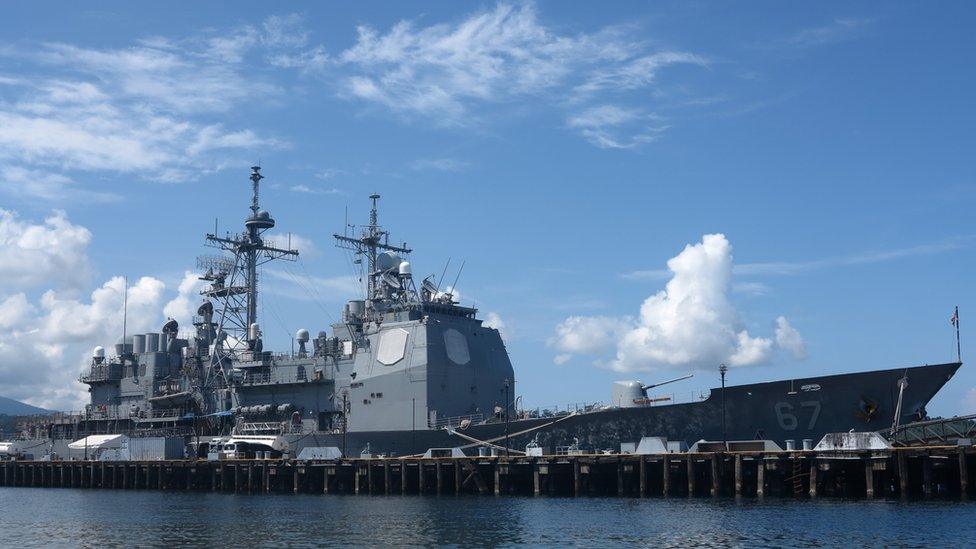
- Published19 July 2012
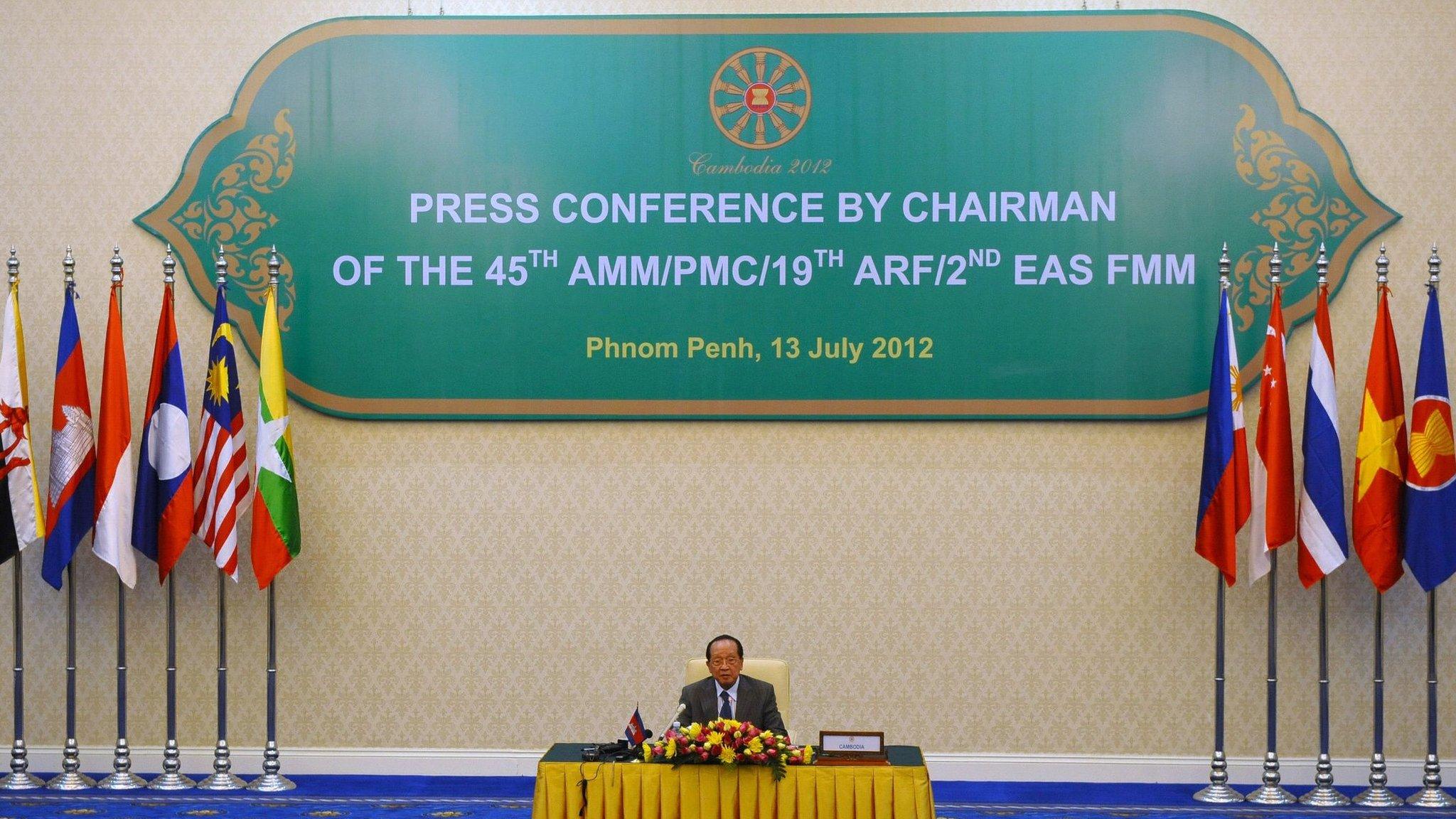
- Published13 July 2012
